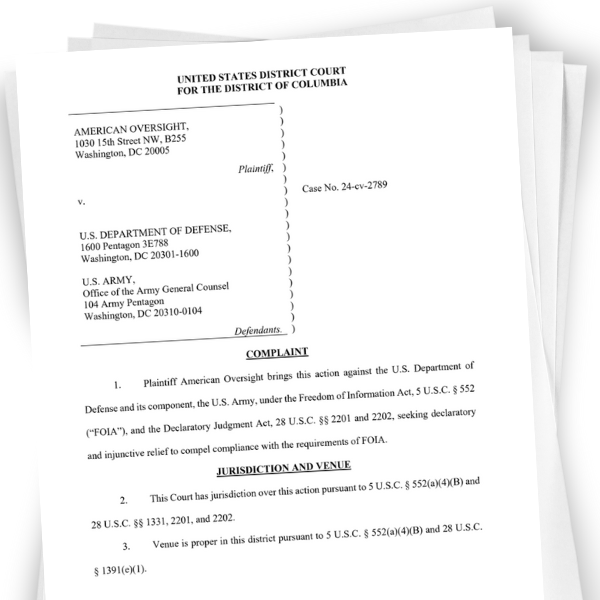
American Oversight Obtains Report from August Incident at Arlington National Cemetery
The report contains significant redactions, including claims of exemptions for ongoing federal law enforcement investigation.

The U.S. Army on Friday released to nonpartisan public records watchdog American Oversight a heavily redacted incident report related to the Trump campaign’s widely reported August altercation with Arlington National Cemetery staff. It effectively confirms the existence of an open law enforcement investigation into the issue.
The report was released by the U.S. Army in response to American Oversight’s Freedom of Information Act lawsuit seeking any incident reports regarding the Trump campaign’s visit to the cemetery on Aug. 26, when Arlington National Cemetery officials reportedly confronted campaign staff about the prohibition against political campaigning at the cemetery.
Statement from American Oversight Interim Executive Director Chioma Chukwu:
“We’re pleased that American Oversight was able to get the report into the hands of the American public so they can see for themselves that there is still an ongoing federal law enforcement investigation into the August incident at Arlington National Cemetery.
“The alleged conduct of the former president and his staff aligns with his history of politicizing the military and violating clear ethical boundaries, and it’s time for the public to have all the facts. American Oversight will be closely reviewing the redactions and continuing our fight to get information to the people.”
Records produced to American Oversight show that the incident occurred on the morning of Aug. 26 at Arlington National Cemetery. According to the executive summary of the heavily redacted Form 2893 — a form typically used to document criminal activity involving the U.S. Army — an unidentified individual “[redacted] with both of [redacted] hands while attempting to move past” and “[redacted] did not require medical attention on scene and later refused when offered.” The offense alleged on the form was simple assault, which, if convicted, carries a term of imprisonment of up to six months. The cemetery employee’s three-page sworn statement detailing the incident was submitted as part of the Form 2893.
The report, dated Aug. 29, notes that an investigation was being conducted by the Joint Base Myer-Henderson Hall Police Department, which handles the Army’s law enforcement as a neighboring base. The Army’s redaction of the incident report pursuant to the FOIA exemption for ongoing law enforcement proceedings demonstrates that there is still an ongoing federal law enforcement investigation, though it is unclear whether that’s being conducted by the same police department.
According to news reports, the Aug. 26 incident occurred when cemetery staff attempted to prevent members of Trump’s campaign from filming and taking pictures while visiting a section where recent U.S. casualties are buried, violating a prohibition meant to guard against gravesites being used for partisan political purposes.
The Trump campaign has disputed media accounts of the incident. Arlington National Cemetery had previously confirmed that there was an incident and that a report — the subject of American Oversight’s request and lawsuit — was filed.
American Oversight submitted a FOIA request for a copy of any such reports on Aug. 30, and on Sept. 25 requested that Arlington expedite the processing of its request. On Oct. 1, 2024, American Oversight filed a lawsuit in federal district court in Washington, D.C., and shortly afterward moved for a preliminary injunction. During oral arguments on Monday, Senior Judge Paul Friedman noted that American Oversight had sought expedition after receiving no response from the Army, and that the urgency of American Oversight’s request had increased as the election draws closer. On Tuesday, he granted American Oversight’s request for a preliminary injunction and ordered the Army to release the records.
While in office, the former president repeatedly sought to politicize the military, and his administration frequently violated the Hatch Act, the federal law prohibiting government officials from using their positions to advance partisan political activity.